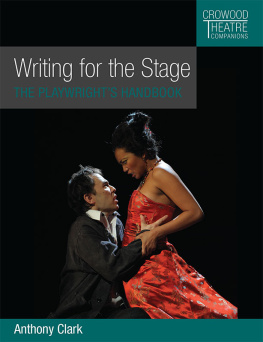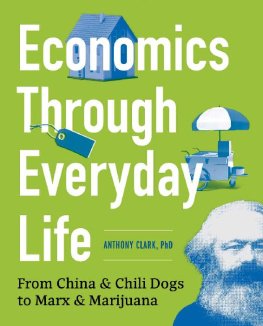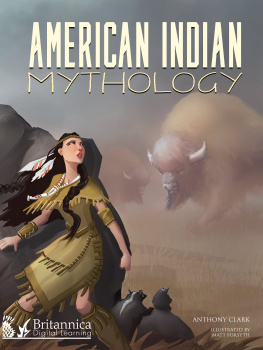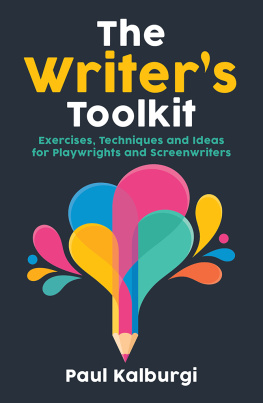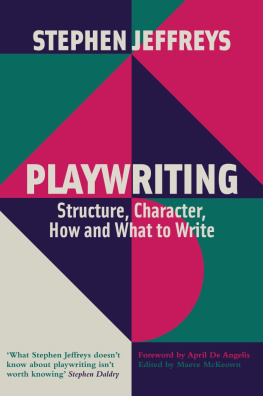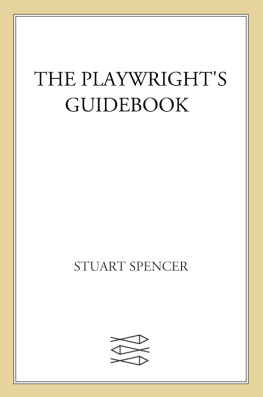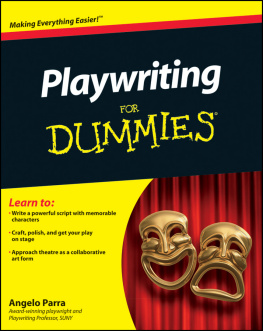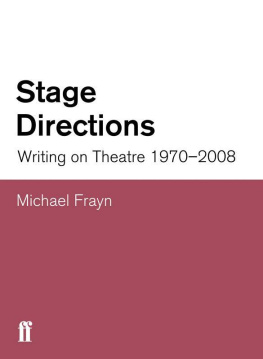Page List
Writing for the Stage
THE PLAYWRIGHTS HANDBOOK
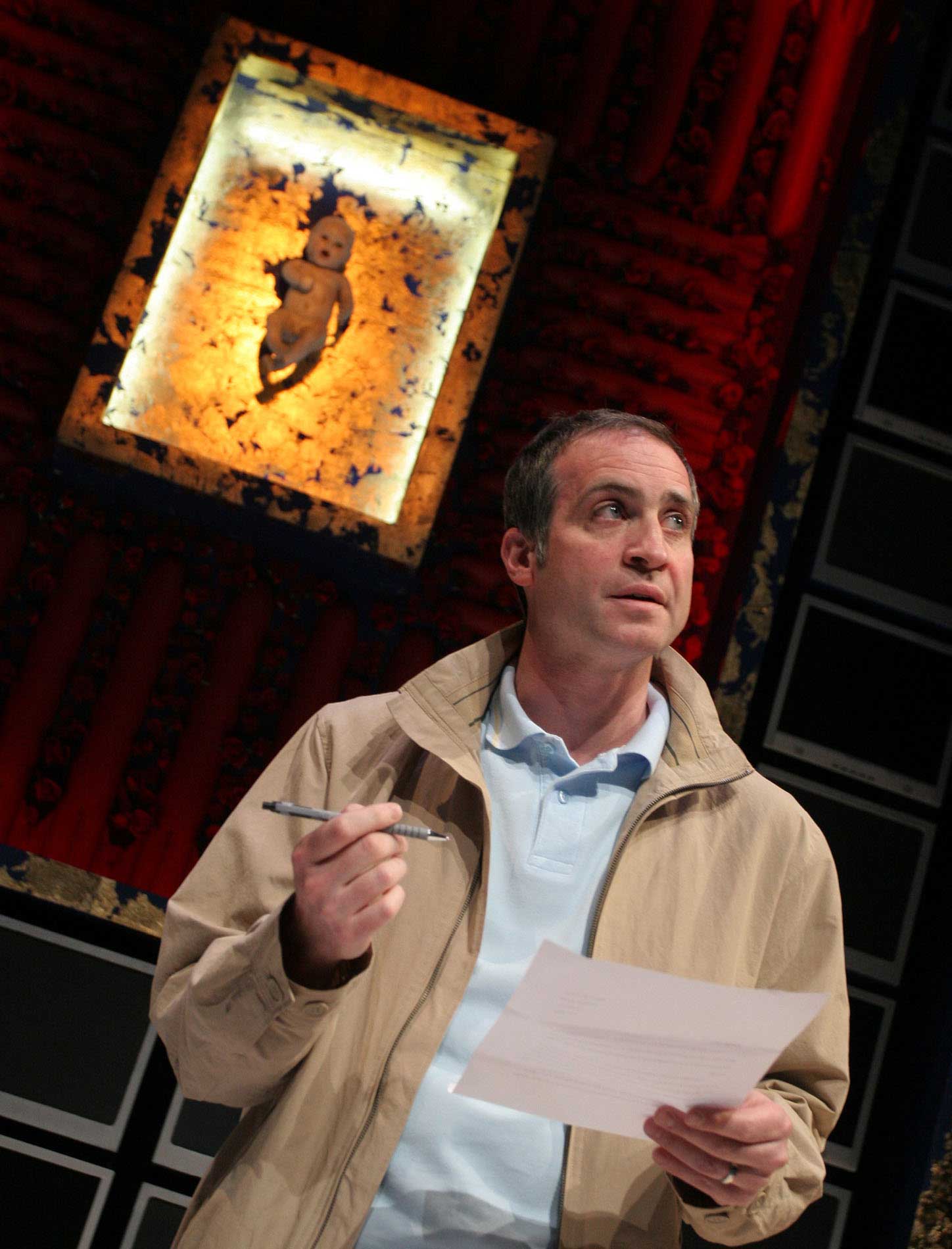
Nick Sidi in Taking Care of Baby (2007) by Dennis Kelly. Premiered at The Door, Birminham Rep. Photograph: Robert Day
Writing for the Stage
THE PLAYWRIGHTS HANDBOOK
Anthony Clark

First published in 2021 by
The Crowood Press Ltd
Ramsbury, Marlborough
Wiltshire SN8 2HR
www.crowood.com
This e-book first published in 2021
Anthony Clark 2021
All rights reserved. This e-book is copyright material and must not be copied, reproduced, transferred, distributed, leased, licensed or publicly performed or used in any way except as specifically permitted in writing by the publishers, as allowed under the terms and conditions under which it was purchased or as strictly permitted by applicable copyright law. Any unauthorised distribution or use of this text may be a direct infringement of the authors and publishers rights, and those responsible may be liable in law accordingly.
British Library Cataloguing-in-Publication Data
A catalogue record for this book is available from the British Library.
ISBN 978 1 78500 903 7
Disclaimer
Every reasonable effort has been made to trace and credit illustration copyright holders. If you own the copyright to an image appearing in this book and have not been credited, please contact the publisher, who will be pleased to add a credit in any future edition.
Cover design by Maggie Mellett
DEDICATION
This book is dedicated to all the playwrights I have worked with and students I have taught who have convinced me of the important role theatre can play in shaping the life of the individual and, therefore, the evolution of society.
ACKNOWLEDGEMENTS
I would like to thank the following for their help in preparing this book: Delia Goddard for patiently putting up with me talking through the contents of each chapter; designer Jessica Curtis for letting me include her design drawings, and Nicola Clark, Ruari Murchison, Ian Tilton, Robert Day and Tristram Kenton for their generous help with the photographs.
ILLUSTRATION CREDITS
Robert Day: pages
Tristram Kenton: pages
Delia Goddard: page
Kevin Ung: pages
ABOUT THE AUTHOR
Anthony Clark read Drama at Manchester University, following a BA Hons degree with a Post-Graduate Diploma in Playwriting. He is currently working as freelance director and playwright, as well as course leader for MA Directing, and MA Dramatic Writing at Drama Centre at Central Saint Martins. He also has his own company, Theatre Accord. Previous posts include: artistic director of Hampstead Theatre (200310), associate artistic director, Birmingham Rep (19972002), associate director, Birmingham Rep (199097), artistic director, Contact Theatre (198490) and assistant director, Orange Tree Theatre (198183). He has freelanced extensively, working with companies that include The National, RSC, Young Vic, Bristol Old Vic, Leicester Haymarket, Nottingham Playhouse and Tara Arts.
His recent plays include: Paradise of the Assassins (Theatre Accord National Tour, 2016), Our Brother David (Watford Palace, 2012), Naked Not Nude (Linbury Studio LAMDA [London Academy of Music and Dramatic Arts], 2014 and Platform Theatre, Central Saint Martins, 2018), The Eighth Continent (Tristan Bates, 2013). Earlier plays include: The Power of Darkness trans. Tolstoy (The Orange Tree, 1983), Wake (The Orange Tree, 1983), Tide Mark (RSC Pit, Thought Crimes Festival, 1984), Green (Contact Theatre, 1985), Matter of Life and Death (50th Anniversary Lorca, Lyttleton Theatre, NT, 1986). And several adaptations for children, including: The Little Prince (Contact Theatre, 1986), the award-winning Red Balloon (Contact, 1990; Bristol Old Vic, 1991; Olivier Theatre, NT, 1996), The Pied Piper (1993), Pinocchio (1996), Winnie The Witch (Birmingham Rep., 2001), Little Wolfs Book of Badness (Hampstead Theatre, 2007). Several of his plays have been published and produced throughout Britain and internationally. The Red Balloon was produced as a Boxing Day Special on Radio 4.
INTRODUCTION
The theatre is an essential art form that is forever evolving. My observations about playwriting are based on my work as a professional director and playwright, and as an artistic director of three theatres in the UK over the past forty years. I have always had a particular interest in giving opportunities to emerging playwrights, as well as producing new plays by more established writers. In recent years I have enjoyed leading an MA course on playwriting for Central Saint Martins, the University of the Arts, London. I have also written, had produced and published a number of original plays and adaptations for a range of different audiences. I like to think I know something of the tremendous effort that goes into writing for the stage, and the challenges the playwright faces in trying to get their work produced.
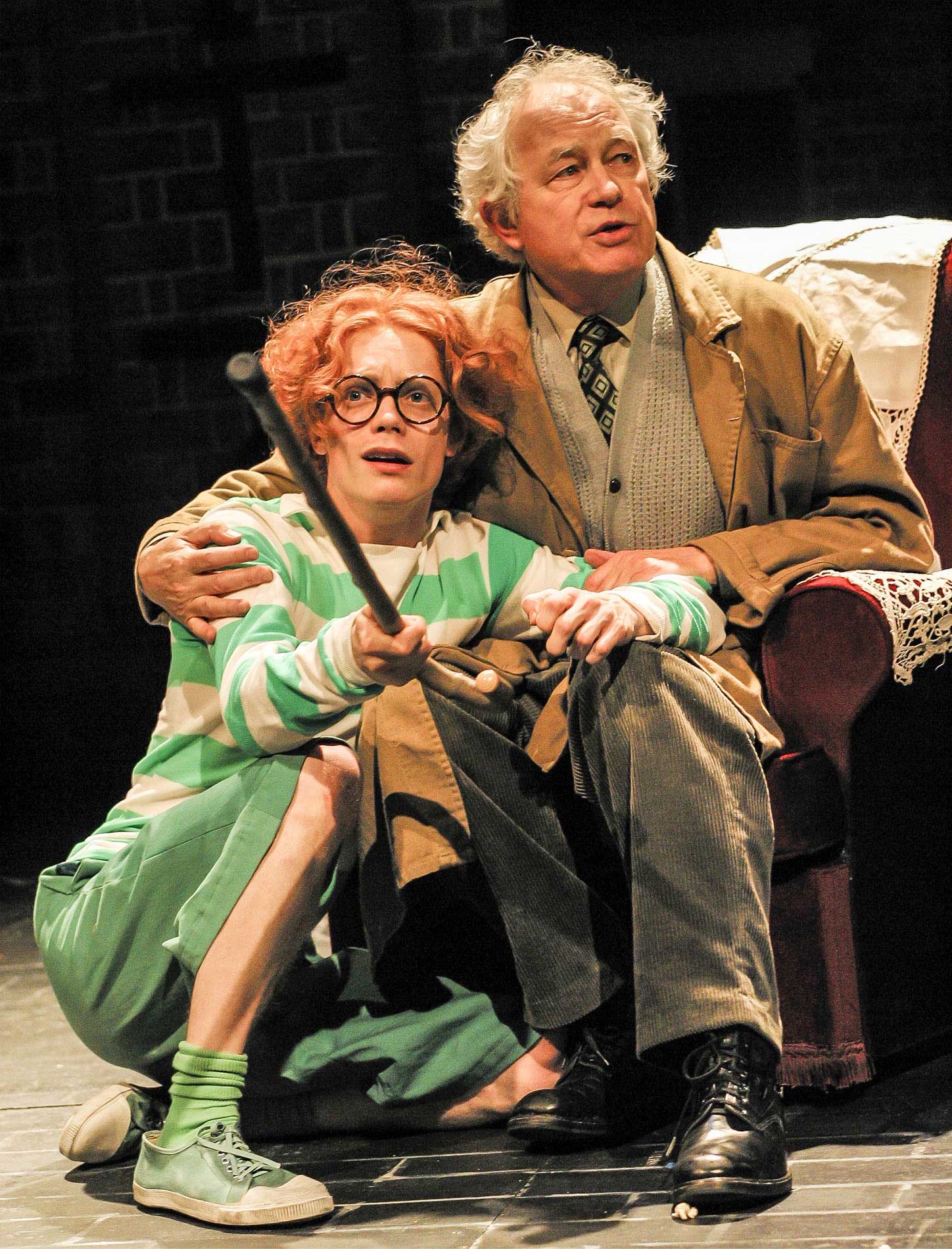
Gregor Henderson-Begg and Alan Rothwell in the premiere of Philip Ridleys Krindlekrax (2002) at the Nottingham Playhouse.
This book is not a history book about the evolution of playwriting. It will be an introduction to emerging playwrights and a reminder to others of some of the skills needed to write a play. It is not a definitive manual, because stage conventions go in and out of fashion, as the content and context in which plays are produced changes. It is not a book of rules. There will always be successful plays that emerge that dont adhere to any of the rules that practitioners and academics identify as essential to playwriting. No teacher is infallible. My aim is to help you to understand something of the art and craft of writing for the stage and to avoid some of the pitfalls. It is to encourage you to make the most of the medium, and to enjoy writing stories in dialogue that speak directly to the times in which you are writing. Different theatre companies commissioning and programming imperatives change constantly in response to public taste and funding priorities. It is important to keep up to speed with what is happening by going to the theatre regularly, reading as many plays as you can and trawling the industry websites.
Given my experience of programming, producing and directing, I will also look at the role of the playwright in the production process.
It is not within the scope of this book to explore in any depth the work of playwrights not writing in the English language. I would urge you, however, if you are serious about developing your craft as a writer, to look at what has been, and is being, achieved by playwrights and theatre-makers in other parts of the world. Keep up with any visiting international touring programmes, and the work presented at prestigious international theatre festivals. Details of which are all available online.
Throughout the book, the you I refer to will be you the playwright.
I started writing plays whilst at Manchester University doing a BA in Drama because I was enthused by the way my teachers taught the subject, the energy and talents of my peers, and I felt passionately about what was going on in the world at the time. It was the late 1970s, a time of punk, the east and the west were still building their nuclear arsenals, racism was rife in all walks of life, and second-wave feminism was making me think about the cultural and political inequalities women faced. I felt I had political things to say and I wanted to see certain things happen on stage that I believed had never been done before. I wanted to create the story and to control the story. Looking back, I have to admit that my knowledge of what had been done, and what was being done, on stage at the time was negligible. All fired up, I wrote and directed my first play at nineteen, a domestic tragicomedy called The Wall . It was set somewhere non-specific, involving a series of arguments that divided a family of four in two. I cant remember what their initial falling out was all about, but maybe that was the point. In the course of the play, the characters dismantled the back wall of their kitchen, which was made up of roughly painted cardboard boxes, and rebuilt it across the room as a crude metaphorical representation of what was literally happening to them. They built it over the kitchen table, so that the two sides couldnt contact each other. It was a naive allegory, perhaps, for The Berlin Wall, which separated East and West Germany at the time. I remember very little about it other than that one side of the family eventually found a way to communicate with the other by talking under the table.

